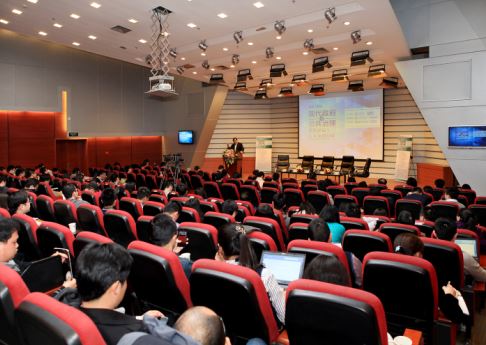No.1: NPC Governance Innovation Held Successfully
In the afternoon of March 15, Tsinghua- CAIJIANG Series Forum on Modern Government and Public Governance No.1: NPC Governance Innovation, jointly started by School of Public Policy and Management (SPPM)of Tsinghua University and CAIJIANG Magazine, was held in the conference hall on the first floor of School of Public Policy and Management, Tsinghua University. The forum was co-organized by the Center for Industrial Development and Environmental Governance (CIDEG) and Tsinghua University Collaborative Innovation Center for Innovation Development and Public Governance, with assistance from Institute for Finance and Economics Research and CAIJIANG.COM.
Dean XUE Lan
China is undergoing a comprehensive and in-depth social transformation, with its national governance system and governability embodied in the national system and system implementation capacity. By far, with the development of Market-Oriented Economy, Chinese society now shows a trend of interest diversification; in this context the social transformation objectively need a breakthrough from the traditional management-control model to establish a realistic modern public governance model.

For this purpose, SPPM of Tsinghua University and CAIJIANG Magazine co-launched the forum, which invites authoritative experts and scholars to share their opinions on specific topics, provides an exchange platform for problem researches and academically supports relevant policies. The series forum, on one hand, seriously focuses on pragmatic discussion of some crucial and urgent issues in the national governance after the comprehensive reform starts. On the other hand, it aims to ideologically portrait the value patterns of national development and social progress.
As the country’s fundamental political system, the National People’s Congress (NPC) System and its practice innovation play a decisive role in public governance. The first symposium was held after two sessions ends this year. Famous experts from public sectors and academic institutions were invited to have a professional discussion on exploratory practice and development path of NPC System Reform.
Prof. XUE Lan, Dean of SPPM and Director of CIDEG of Tsinghua University, and Mr. DAI Xiaojing, CEO of SEEC and Vice Chief Editor of CAIJING Magazine addressed the opening ceremony respectively. Dr. ZHANG Yandong, Senior Observer and Vice General Manager of CAIJING Magazine, hosted the opening ceremony. Prof. YANG Yansui from SPPM of Tsinghua University, Ted TOKUCHI, Managing Director of CITIC Securities Corporation and Academic Committee Member of CIDEG, and Dr. CHEN Ling, Vice Director of CIDEG also attended the forum.
Prof. PENG Zongchao, Vice Dean of SPPM of Tsinghua University, hosted the forum. The theme of the first phase was “Innovation on National People’s Congress System”. Mr. KAN Ke, Vice-director of the Legislative Affairs Commission of NPC Standing Committee, delivered a keynote speech on “Promoting Theoretical and Practical Innovation of NPC System”. Prof. SUN Zhe from Institute of International Studies of Tsinghua University gave a speech with the topic of “Enlightenment of Western Parliamentary Development on NPC Reform”. Prof. QIAN Yi from Department of Environmental Science and Engineering of Tsinghua University, Academician of the Chinese Academy of Engineering, and Academic Committee Member of CIDEG commented.
The second phase of the forum focused on “NPC Budget System Reform”. Mr. XU Shanda, the former Vice Director of the State Administration of Taxation, Head of Institute for Finance and Economics Research, firstly gave a keynote speech on “Discussions on Fiscal and Tax Reform through the Construction of National People’s Congress System”, and then Prof. LIU Jianwen from School of Law, Peking University, made a speech on “Reform and Prospect on China’s Budget Supervision System”. Prof. WANG Youqiang from SPPM of Tsinghua University, and Mr. HUANG Shisong, Deputy Secretary-General of Standing Committee of Beijing Municipal People's Congress and Research Director commented respectively.
In the open discussion section, the participants, including guests, scholars, media reporters and audience, had warm communications and interactions. The first symposium came to a successful conclusion. (News from CIDEG)